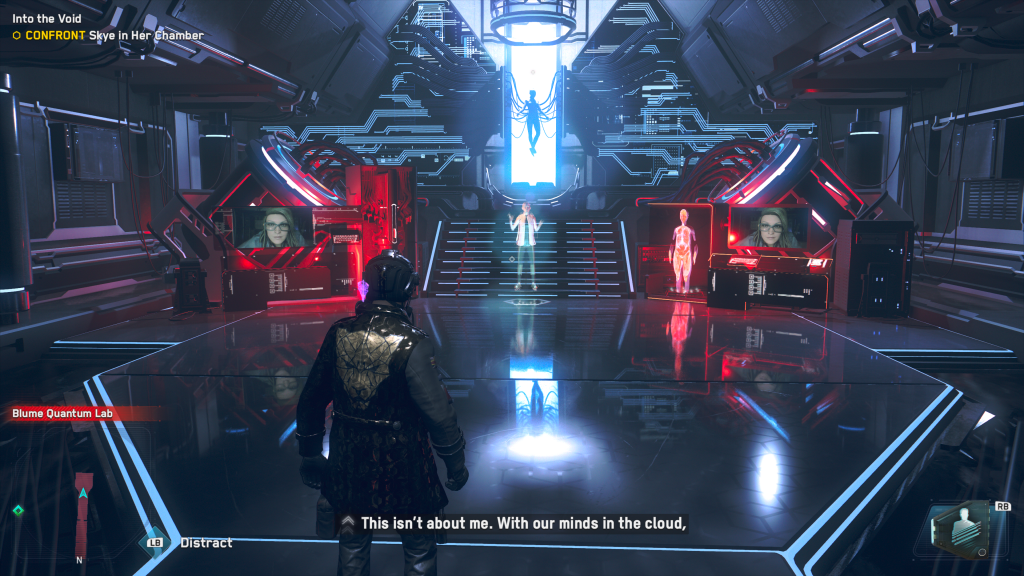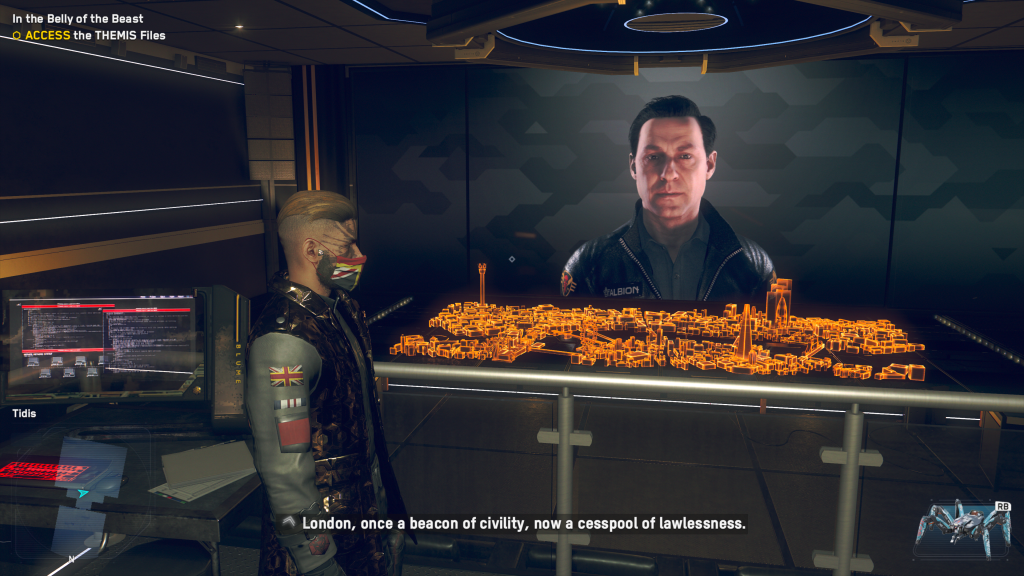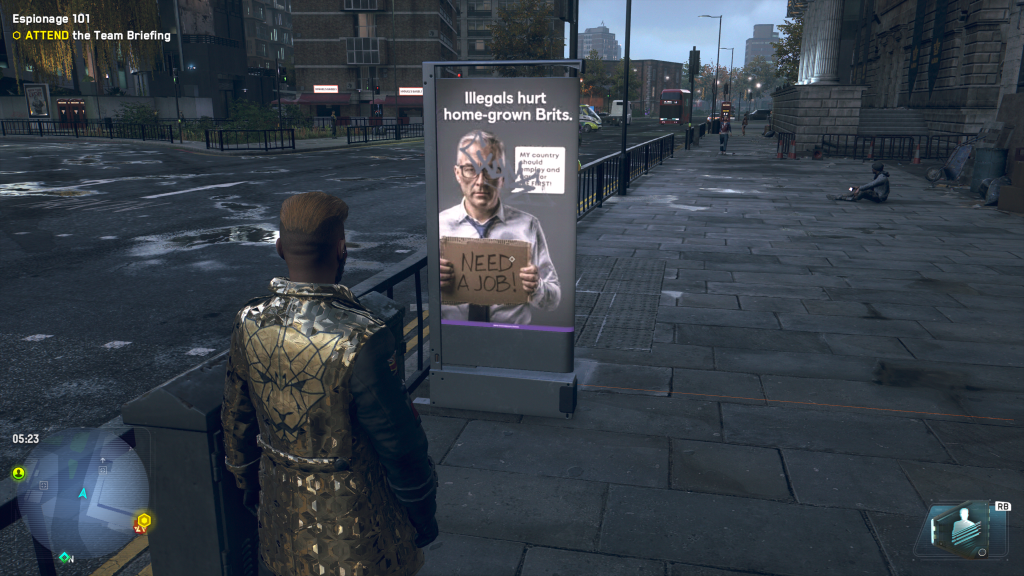Controlling any character you meet in a dystopian, authoritarian post-Brexit London? Watch Dogs’ third outing really locates the franchise’s groove.
As with many games franchises, Watch Dogs took a while to find its feet. When the first Watch Dogs arrived in 2014, it showed that playing as a hacker could translate into fun open-world, action-adventure gameplay, and 2016’s Watch Dogs 2 felt like a general, overall improvement on the first game which didn’t quite manage to carve out a distinctive personality of its own.
However, Watch Dogs Legion sees the franchise really find its feet, having developed the confidence to take some risks and have a bit of fun. And it has a new feature which, on paper, sounds pretty revolutionary: you can play the entire game as any random character you encounter, while wandering its virtual London streets.

In practice, that mechanic proves to be a fun diversion rather than a true game-changer. As you wander the streets, in classic Watch Dogs fashion, you can scan all the characters you pass, to see what they do and what their skills are, and you also get a one-liner (often amusing) which sums up their character. If you want, you can opt to recruit them to DedSec; in order to close the deal, you often have to perform mini-side-missions. We found that as the game progressed, we would often switch to favourite characters who might not necessarily have the best skills or perks for whatever mission we were enacting, but who we grew attached to more for the cut of their jib than anything else.
Story-wise, Watch Dogs Legion opens in pseudo-James Bond manner: the prologue sees you controlling Dalton, a DedSec operative who is a full-on spy, as he attempts to defuse a bomb in the Houses of Parliament. He carries out his mission, but a number of other bombs go off elsewhere in London, Dalton is gunned down by a drone, and London descends into chaos and anarchy.
Fast-forward a few months, and London is pretty much under martial law, administered by the private military company Albion, abetted by the East London crime family Clan Kelley, a bunch of MI5-like spooks called SIRS and a company called Broca Tech.
It’s up to you to get DedSec back up and running again, so you head to the hacking organisation’s safehouse just off Parliament Square. After getting Bagley, the very human-sounding (he even swears) AI system up and running, you discover that DedSec’s leader, Sabine, managed to escape the attack (perpetrated by a shadowy organisation called Zero Day although, of course, DedSec has been saddled with the blame for it) and is in hiding but contactable.

So you set about taking down the organisations who were really responsible one by one – before long, the story splits into threads which you can swap between, and a number of side-missions emerge. Anyone who played a previous Watch Dogs will find Legion’s gameplay quite familiar, although this time around, it has been honed to such extent that any dross and filler feels as though it has been weeded out, leaving you with the fun stuff.
While you do get weapons (non-lethal ones are standard, although some specialist characters are given weapons that fire real bullets), stealth, hacking and the judicious use of an array of gadgetry provide the best means of progressing. The familiar mechanism of hacking into security cameras from outside a building, then chaining your way through them until you find your objective is present and correct.
Gadgets galore
But in Legion, you have many more mission-solving options. Spiderbots, in particular, feature heavily: tiny spider-shaped robots that can jump and tap into things that you would otherwise have to access manually. At times, you must manipulate them through what are effectively platforming sequences.
Drones also abound: London’s Albion-controlled streets are awash with different types of them, mostly employed to keep the population at bay in conjunction with the private military police who patrol most streets (taking them down and freeing the innocent citizens they arrest is one of the game’s many random pleasures). As you amass Tech points – the means of acquiring new gadgets and upgrading the ones you have – you unlock the possibility of hacking and hijacking the various different types of attack drones that Albion sends after you.
But the best drone-related activity in the game involves hijacking one of the huge cargo drones, landing it and climbing on top, effectively giving you the ability to fly around London, albeit pretty slowly. Cargo drones can also pick up and drop objects, so can be used as primitive bombers.
Although you acquire a diverse set of gadgets, you can only equip one (although some specially skilled characters are given an extra one). They include various types of melee enhancers, attack spiderbots which, for example, can be placed on cars in order to operate as de facto turrets and, most usefully of all, a cloaking device which lets you turn invisible for a short while. It’s possible to enter missions equipped with the wrong gadgets; slightly annoyingly, you can only do a gadget-swap when you’re not engaged in any particular activity.
Mission diversity
Anyway, part of the fun of Watch Dogs Legion involves working out how to get through missions even if you’re equipped with the wrong gadget: the game has a great feeling of supporting emergent behaviour. The missions are admirably diverse – the familiar electrical-circuit-completing puzzles from previous iterations of the game figure heavily, for example, whereas others involve driving (cutely, all the black cabs in Legion’s London are self-drive ones). There are also Hitman-like sequences in which you’re disguised and must be even more stealthy than usual, and some great ideas are examined then cruelly discarded, such as a long sequence in which you fly a micro-drone around computer circuitry.

Post-Brexit London depicted
Watch Dogs Legion’s depiction of London is also a huge joy. As expected, the game presents a squeezed, truncated version of the city, much smaller than it is in real-life, punctuated by very recognisable landmarks, So, you frequently get little jolts of excitement and recognition when wandering around a familiar haunt.
On top of the familiarity, there’s a layer of jeopardy provided by the game’s storyline: most streets have had checkpoints added them with turrets on top, soldiers are everywhere, hassling, beating and arresting the citizenry, and once you’re out of the most central areas, the streets have been allowed to descend into squalor and rot.
South London, where I live, has become even more squalid than it already is; the Oval cricket ground, for example, has been converted into an internment camp (a nice touch, since in WWII it was readied for us as that, but never occupied). Drones fill the sky, mostly with a sinister agenda.
A political warning post-Brexit
In Legion, London, in other words, has become an extreme right-wing authoritarian’s paradise and although none of them would ever admit it from the safety of their hedge-funded mansions, it’s the sort of scenario the architects of Brexit dream of, featuring an utterly cowed populace that dares not rock the boat for fear of being disappeared.
Thank goodness, then, for DedSec, the random, ragtag assemblage of hackers putting forward some resistance. To be fair, Watch Dogs Legion never refers explicitly to Brexit, and its main message concerns the creeping integration of technology into all areas of society, and specifically what would happen if firstly, every electronic device in a city became accessible centrally (if you’re an enthusiastic embracer of the Internet of Things, you really should play it) and secondly, if all that city’s inhabitants were fitted with devices attached to their optic nerves.
Everyone will take something different from Watch Dogs Legion in terms of the moral of its story, and the story itself somewhat loses the plot in its latter stages with a preposterous twist that exposes a welter of plot-holes which, nevertheless, don’t render it any less entertaining. But there’s no doubt that it’s both highly thought-provoking and splendidly entertaining to play. Its developer, Ubisoft Toronto, deserves huge plaudits for side-stepping any urge to take a bland route designed to minimise the chance of offending any particular political tribes, and instead going all-in and enjoying itself. Modern cross-platform games are often criticised for feeling as though they have been designed by a committee; Watch Dogs Legion notably bucks that trend.
